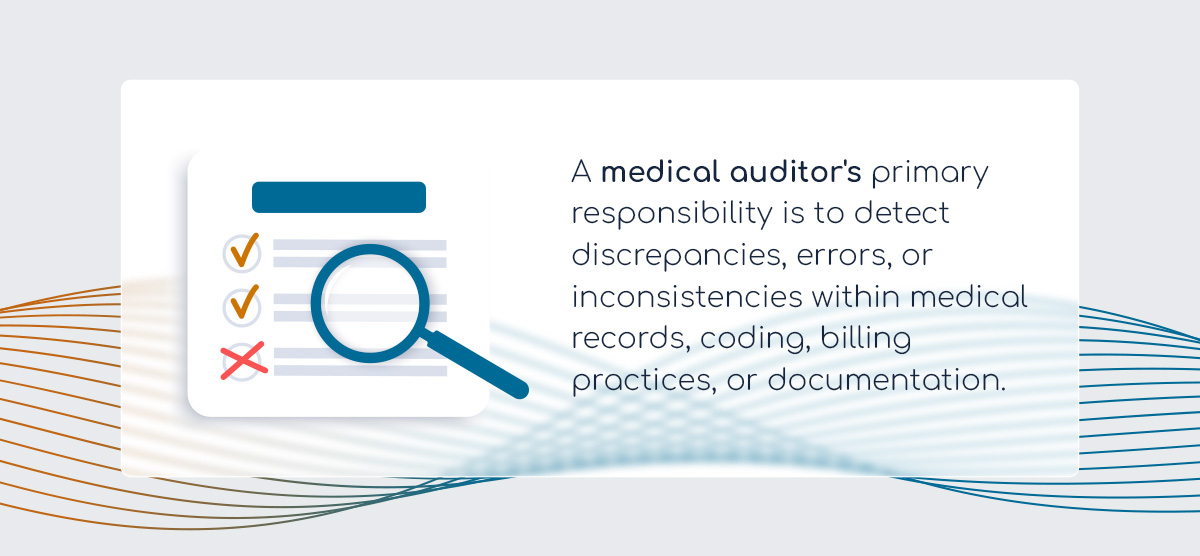The healthcare industry can be complex, demanding high accuracy and compliance standards. Health providers must offer quality patient care and maintain operational efficiency and financial integrity. Meeting these requirements requires precise information, meticulous record-keeping, and adherence to stringent regulations. The practice of medical auditing lies at the heart of this commitment to accuracy. How does medical auditing work? What does a medical auditor do? This article is your comprehensive guide to healthcare auditors. Learn what their responsibilities are and how to become a medical coding auditor.
What Is Medical Auditing?
Medical auditing involves analyzing and evaluating healthcare documentation, processes, and finances. Medical auditing ensures the accuracy of these areas and whether they comply with regulations. More importantly, it provides the quality of patients’ care. Healthcare facilities of all types can benefit from medical auditing — from solo and group practices to hospitals and entire healthcare systems. Medical auditing aims to identify discrepancies, errors, or areas of improvement — particularly within medical coding, billing, and general operations. Healthcare organizations can identify inefficiencies, prevent fraudulent practices, and enhance patient outcomes with thorough audits. These practices ultimately reduce financial risks and optimize revenue cycle management.
What Is a Medical Auditor?
A medical auditor is a professional who specializes in assessing and evaluating various aspects of healthcare. They understand industry regulations and auditing best practices. These professionals have strong analytical skills, attention to detail, and comprehensive knowledge of medical terminology and procedures. They ensure every piece of data, diagnostic code, and financial transaction is highly accurate and compliant. As the healthcare services market grows, the demand for skilled medical auditors will increase by 9% by 2030. This statistic promises auspicious career opportunities for those interested in this industry.
What Does a Medical Auditor Do?
A healthcare auditor’s primary focus is overseeing the work of medical coders and billers. However, their responsibilities include a comprehensive range of tasks that ensure accuracy, compliance, and ethical practices within healthcare systems.
Analyzing Medical Records
Medical code auditors must examine patient records. They verify that medical records reflect the care provided and that coding corresponds to their diagnoses and procedures. They check for completeness, accuracy, coding, and documentation standards compliance.
Ensure Compliance With Regulations
Medical auditors help organizations align with complex healthcare regulations and standards. These professionals monitor practices’ compliance with coding guidelines provided by the following organizations, federal programs, and laws.
- International Classification of Diseases
- Current Procedural Terminology
- Healthcare Common Procedure Coding System
- Medicare
- Medicaid
- Health Insurance Portability and Accountability Act
Identify Errors and Inaccuracies

A medical auditor’s primary responsibility is to detect discrepancies, errors, or inconsistencies within medical records, coding, billing practices, or documentation. Once they identify inaccuracies, they start investigating them, rectifying errors, and providing recommendations to prevent future discrepancies.
Conduct Audit Reviews and Investigations
Medical auditors perform routine audit reviews or targeted investigations to ensure the healthcare organization’s accuracy and compliance across various departments or providers. Specifically, they’ll investigate coding accuracy, billing practices, and adherence to specific regulations.
Analyze Data and Reporting
After reviews, auditors will analyze their findings and compile reports that detail compliance status, identified issues, and recommendations for corrective actions. Medical auditors can then present data-driven insights to management or regulatory bodies.
Provide Recommendations for Improvement
Medical auditors also play consultative roles. They offer valuable insights and recommendations to improve coding accuracy, documentation practices, and overall compliance. They may also suggest training programs or workflow adjustments to mitigate identified risks.
Collaborate With Medical Staff
Medical coding auditors collaborate with different departments within a healthcare organization, often working closely with healthcare providers, coding specialists, billing departments, and administrative staff. Medical auditors will clarify documentation requirements, train people on compliance standards, and facilitate effective communication regarding audit review findings.
Ensure Ethical and Legal Practices
Of course, medical auditors also play a crucial role in upholding ethical standards and integrity. They ensure all healthcare practices and actions comply with legal and conventional guidelines. Tasks include preventing fraud and abuse or corrupt practices within the system.
Continuous Education and Training
The healthcare industry continues to change. Staying abreast of new regulations, coding guidelines, and industry best practices is vital. Medical auditors can attend training programs and maintain relevant certifications to keep up to date.
How to Become a Medical Auditor
Those who want to pursue a career in medical auditing must gain relevant education, experience, and specialized training.
Formal Education
While only sometimes mandatory, a background in healthcare provides a valuable starting point by providing the basic foundation. Many professionals pursuing a career in medical auditing opt to pursue formal education by earning degrees in healthcare administration, health information management, or related fields. Some complete degrees specific to medical coding or billing to gain in-depth knowledge of healthcare documentation and coding systems.
Certifications and Credentials
Obtaining a medical auditor certification is necessary for building medical auditing expertise. Often, people seek guidance and accreditation from reputable associations such as those from the National Alliance of Medical Auditing Specialists. NAMAS’ Certified Evaluation and Management Auditor certification is particularly valuable for those focusing on evaluation and management auditing. The CEMA certification demonstrates skill in reviewing documentation and coding accuracy for E&M services, a critical component of medical audits. NAMAS can also help those seeking to prepare for their CPMA exams. They provide comprehensive educational services tailored for medical auditors and coding professionals.
Industry Experience
Industry experience will always be invaluable. Start with entry-level positions in healthcare settings, particularly roles involving medical coding, billing, or health records management. An internship or traineeship can provide hands-on experience and practical insight into the nuances of the field.
Continuous Learning
The medical industry is dynamic, with regulations and best practices frequently evolving. Staying updated with changes in healthcare regulations, coding guidelines, and industry standards is crucial. Attending webinars, seminars, and workshops or completing online courses ensures that skills remain sharp and knowledge remains current. For example, NAMAS offers continuing education opportunities for medical auditors, such as live and online Medical Auditing Boot Camp training, that allows participants to earn continuing education units. NAMAS offers weekly webinars, monthly boot camps, and regular interactive workshops regarding medical auditing.
Contact DoctorsManagement to Learn How We Can Help
Those who wish to know more about medical auditing — whether obtaining CPMA certification or learning about healthcare compliance — should contact DoctorsManagement. Our team has over five decades of expertise, tailoring solutions to fortify medical practices against regulatory risks while fostering optimal patient care. Solutions include medical accounting, documentation and coding audits, and staff education and training through NAMAS. Please contact us today for a free consultation to learn how we can help you.

























